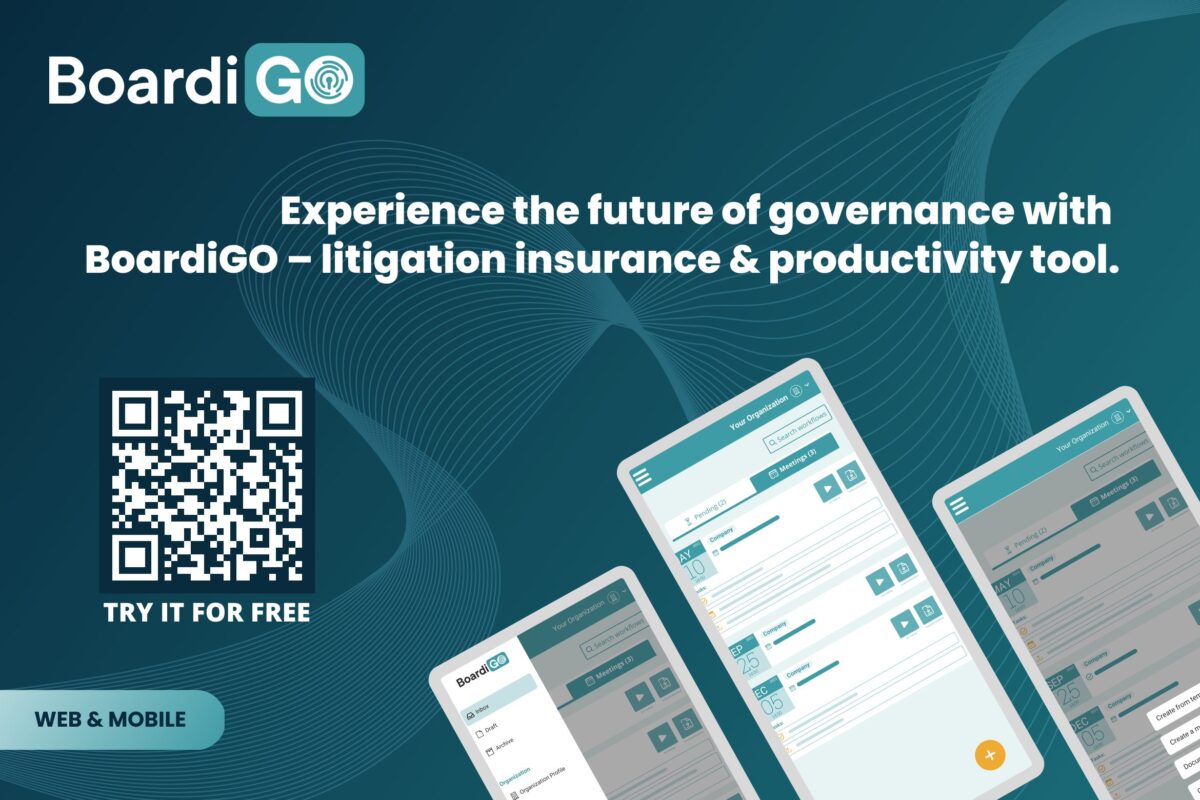The role of compliance in governance has never been more critical, as businesses face an increasingly challenging regulatory landscape due to constant pressure to ensure compliance with a myriad of legal, regulatory, and industry standards.
Compliance is no longer optional at the board level; it is an integral part of corporate governance that directly impacts a company’s reputation, financial stability, and operational efficiency, writes Julien Jenoudet, a seasoned entrepreneur with more than 20 years of senior management experience.
Jenoudet is CEO of BoardiGO, a comprehensibe SaaS software solution that offers both web and mobile accessibility, designed to streamline and modernise governance processes for organisations of all sizes. The platform showcases an intuitive interface, promoting smooth collaboration, protected document storage, and swift decision-making processes, enhancing efficiency and reducing the time spent on administrative tasks.
The Thomson Reuters Institute‘s 2023 State of the Corporate Law Department report highlights a growing recognition of the importance of compliance in mitigating legal and regulatory risks for organisations.
Since 2019, compliance has seen a significant increase in strategic focus among law departments. While only 15 per cent of respondents listed it as a strategic focus area in 2019, that number surged to 22 per cent by the end of 2022.
As governance is not immune from this increasing strategic focus on compliance, it is crucial to understand the potential regulatory and legal risks that board members may face from their actions or decisions while on the board.
Both of these types of risk can have significant consequences for the board and the organisation. Therefore, it is necessary to take proactive measures to mitigate these risks and ensure compliance with all applicable laws and regulations.
Mitigating risks
Regulatory risks arise when a company fails to comply with regulations established by various regulatory bodies designed to protect investors and ensure fair and transparent markets. Non-compliance can result in fines, sanctions, reputational damage, and increased regulatory scrutiny in the future.
Legal risks, on the other hand, can emerge when disputes arise between different stakeholders in a company, particularly shareholders. These disputes can stem from a variety of issues, including executive compensation disagreements, mergers and acquisitions, and other strategic decisions. Unfortunately, these conflicts can lead to costly and lengthy litigation.
To effectively mitigate these risks, companies must have robust governance frameworks that prioritise compliance and transparency. This requires implementing strong internal controls, such as policies and procedures to ensure compliance, as well as tools to track and monitor compliance continually.
A simple solution, and a way to have affordable litigation insurance, is to ensure that the board’s minutes reflect consideration of anything that the law requires the board to consider. “Minutes are the formal records of discussions in a board or committee of a corporation, providing a detailed record of the board’s actions and decisions.
And the reason they are the most important form of litigation insurance is that they are heavily relied on in litigation, especially in cases involving whether a board fulfilled its fiduciary obligations,” said Joe Grf, professor at the Stanford Law School and former commissioner of the US Securities & Exchange Commission, on the a16z podcast.
The digital revolution in governance management
As governance management becomes more complex, traditional methods such as manual processes and paper documentation are no longer adequate. This has led to the emergence of digital platforms that provide an innovative solution to these challenges.
By centralising and automating governance, these platforms enable organisations to access crucial information from past meetings anytime, anywhere. The result is minimised human error, guaranteed consistency, and increased productivity. Furthermore, these platforms allow organisations to proactively identify and address potential issues, cultivating a culture of continuous improvement and risk mitigation.
The power of digital platforms is undeniable when it comes to enhancing compliance management. With automation handling the tedious and repetitive tasks, users can focus on high-level decision-making and strategic planning. Platforms like BoardiGO allows users to create custom workflows and automate the creation of the meeting agenda, board-packs & minutes, making it easy for every member of the board to stay up-to-date with the latest information. This level of efficiency not only keeps organisations ahead of regulatory changes but also promotes seamless collaboration among users.
Embracing digital governance platforms is not just a trend, but a strategic move that equips organisations with the necessary tools to expertly manage compliance obligations and ensure lasting achievements.

Image and article originally from thefintechtimes.com. Read the original article here.

